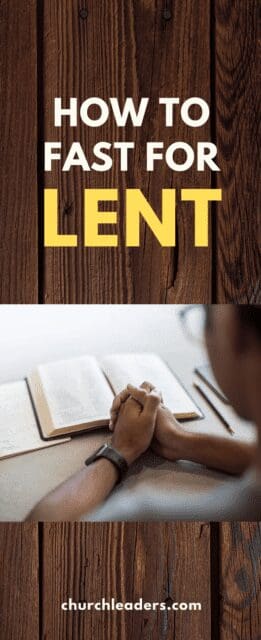According to a recent Barna survey, 41% of Christians follow the liturgical year “very closely throughout the year,” with more people following it more loosely. This seems to represent a growing number of people over the past few years, according to informal conversations we have with those we coach and train.
Lent starts on Ash Wednesday (February 26 this year), and lasts until Easter Sunday (April 12th this year).
One of the traditional practices of Lent is fasting. We are told in Matthew 4:1-11 that Jesus spent forty days fasting in the wilderness and afterwards “he was starving.”
Many of us have fasted before – perhaps in advance of some surgical medical procedure, perhaps the religious tradition we grew up in practiced a Lenten fast (no meat on Fridays, e.g.), or maybe you’ve even fasted for some wild and crazy crash diet!
Fasting can be a powerful practice for a Christian, but it’s also significantly misunderstood, culturally challenging, and therefore decidedly under-practiced.
Lent would be a great time to experiment with fasting, but it’s important to understand what you’re getting yourself into! So we’ve written up a few pointers on how to fast for Lent (or any other time).
What fasting is and isn’t
Christian fasting isn’t the same thing as dieting, or going on a hunger strike, or punishing our bodies, or fasting for a medical procedure.
Christian fasting is not:
- A way to suffer for God
- A spiritual practice that demonstrates how pious or devout you are
- Righteousness (i.e. it doesn’t equal holiness or sanctification)
- A way of trying really hard spiritually that God will respond to
- The same thing as repenting of sin (we don’t “fast” from sin, we confess it, receive forgiveness, and turn from it)
- An addiction treatment program (if you feel powerless to break a dependence, reach out for help!)
Instead, Christian fasting is intentionally withholding something we’d normally partake in (normally food) for the purpose of creating space in our lives to feast on the presence of Jesus “directly.”
Christian fasting is:
- Wisdom – it’s love and knowledge meeting together in a practice that avails us to God’s resources to meet our needs.
- Training – it’s the indirect effort that gives us access to something we can’t try or make happen on our own.
- Surrender – it’s a voluntary “making ourselves weak” so that we can know the strength and power of God (2 Cor 12:9-10).
Simply put: fasting is a way to place ourselves in the way of grace by withdrawing our reliance on earthly things so that we can feast on God’s presence and power.
How To Fast For Lent
If you’ve never practiced fasting before, an easy way into the practice is to engage in a partial fast. A partial fast can involve food and drink, or certain habits. Here are some possibilities for a partial fast:
- Fasting from foods associated with “feasting”: chocolate, desserts, coffee/caffeine, alcohol, etc.
- Fasting from media or entertainment: cell phone, TV, streaming video, radio, music, email, computers, video games, etc.
- Fasting from habits and comforts: shopping, looking in the mirror, makeup, elevators, parking in a spot close to the store, finding the shortest checkout line, reading online, following sports, etc.
Here are some questions to help you discern a partial fast that will be challenging enough to be fruitful (from Aaron Damiani’s book The Good Of Giving Up: Discovering the Freedom of Lent):
- What cravings have a hold on me?
- What would be truly liberating to leave behind?
- Short of an addiction, have I become dependent on a particular food, drink, substance, or activity?
- What would be truly challenging for me to give up during Lent?
- What is Jesus asking of me?
As you pray through these questions, try picking one food or drink and one media/comfort/habit to give up, and then share this with your spouse or a friend as a way to embrace accountability.


